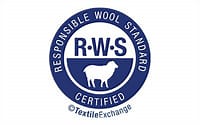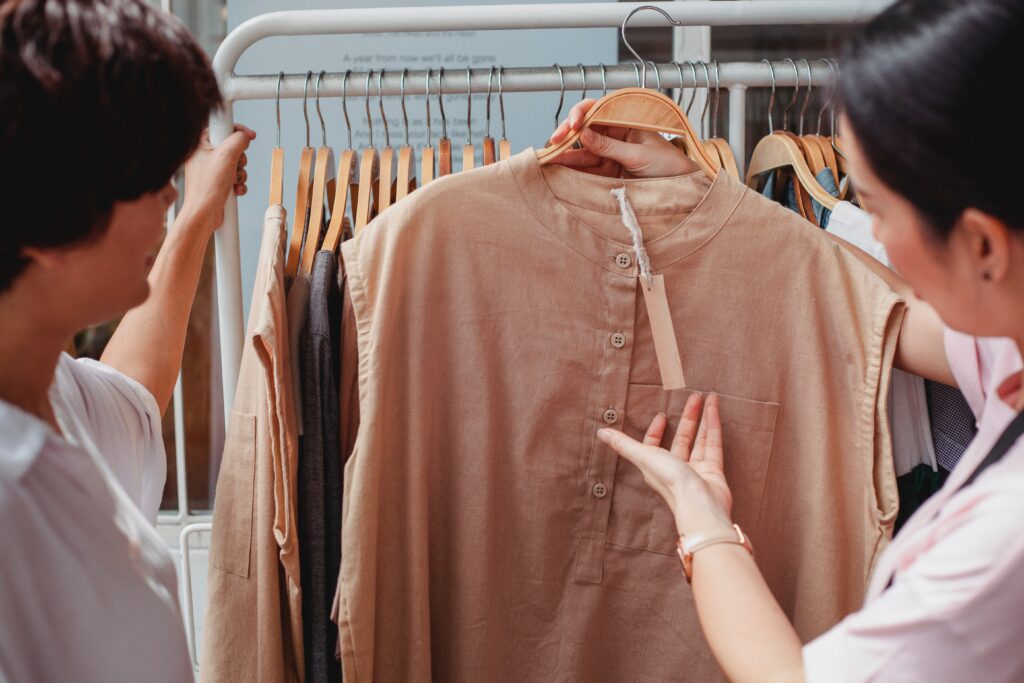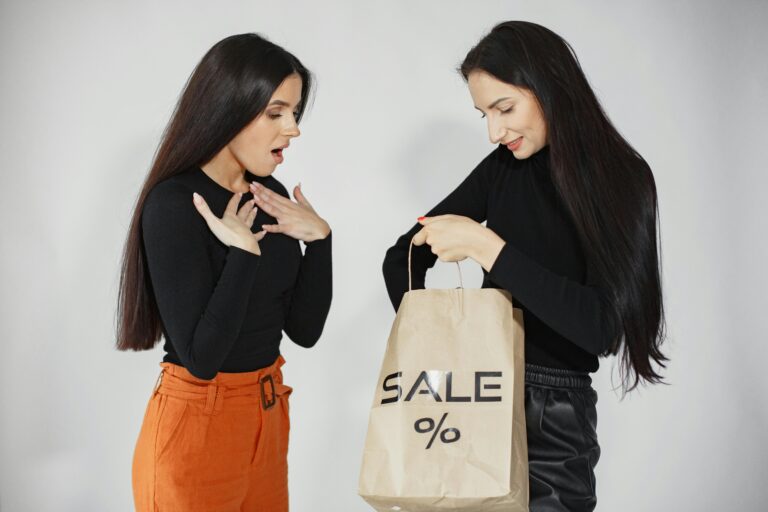Do you want to know if the brand you like is sustainable, or are you finding it difficult to determine whether your clothes are consciously made? Let’s dive right into this blog post to answer our doubts.
As consumer awareness of environmentally friendly clothing continues to rise, some companies resort to misleading tactics known as greenwashing. Achieving true sustainability in the fashion industry demands significant effort from brands and can impact their profitability. This effort includes ensuring fair wages for workers, utilizing eco-friendly materials, and making other costly choices. Due to these challenges, certain brands may promote themselves as sustainable even when their practices do not entirely align with that claim.
check out this blog to know about greenwashing in fashion world
What is greenwashing in fashion and how can you spot one?
It can be challenging for many of us to thoroughly research the eco-friendliness of various fabrics and materials used in clothing. Sometimes we might rely on a “100% cotton” label to make assumptions about sustainability, without delving into the actual environmental impact behind the scenes.
To determine whether the brand is truly selling sustainable clothes or not, it is important to verify if the brand has the necessary certifications to back up its claims.
These certifications are endorsed by various organizations and governing bodies, which establish criteria and carry out evaluations to ensure that products adhere to specific standards regarding sustainability, safety, and ethical practices. Certifications also create transparency between a brand and consumers.
It’s important to understand that there are no universal regulations for sustainability in the fashion industry. Sustainability certifications are developed by third-party organizations, each with its own specific set of standards and practices.
To provide some context, the emergence of textile certifications can be likened to a movement that began in the 20th century. As consumer consciousness grew, various organizations launched different certifications, each addressing specific criteria. For example, PETA’s certification focuses on animal welfare, while GOTS was established to uphold textile standards.
It’s worth noting that while a brand isn’t required to obtain every certification to be considered sustainable, adhering to the practices of even one certification allows them to label themselves sustainable.
A Brief History on Certifications:
The origins of sustainable clothing certifications can be traced back to the broader organic and fair trade movements of the 20th century. These movements initially focused on food production but soon expanded to include textiles as consumers became more concerned about the impact of their clothing choices.
The first Fair Trade certification, named Max Havelaar, was launched in the Netherlands. This certification aimed to ensure fair prices and better working conditions for producers in developing countries.
The concept quickly gained popularity, and by the 1990s, Fair Trade certification began to be applied to cotton and other textiles.
Now that we understand the importance of certifications, let’s explore which ones to seek. I’ve compiled a list of the most well-known and recognized certifications.
Global Organic Textile Standard (GOTS)
What it covers:
GOTS is the top global standard for organic fibers. It includes ecological and social criteria and is supported by independent certification.
Why it matters:
GOTS ensures that the entire textile supply chain is organic and socially responsible. This means the product must contain at least 70% organic fibers, and the entire supply chain – from the harvesting of raw materials to environmentally and socially responsible manufacturing – must meet strict criteria.

ource: GOTS websiteCertified GOTS brand’s will have this logo on their packaging label or hangtag.
Link: Global Organic Textile Standard (global-standard.org)
B Corp
What it covers:
B Corp certification involves a thorough assessment of a company’s impact on its workers, customers, community, and environment. This certification involves a rigorous assessment of various factors, including ethical sourcing, employee welfare, environmental practices, and community engagement.
Why it matters:
It matters because it provides a trusted, third-party validation that a company meets high standards of accountability, transparency, and overall positive impact, helping consumers and investors identify businesses that are genuinely committed to sustainability and social responsibility.

Certified B Corp brand’s will have their B Corp certification information on their websites, highly used in promoting a brand.
Link: B Corp Certification demonstrates a company’s entire social and environmental impact
Fair Trade Certification
What it covers:
Fair Trade certification focuses on the social and economic well-being of workers in the supply chain.
Why it matters:
By choosing Fair Trade Certified clothing, you support better working conditions and fair wages for farmers and workers. This certification also promotes sustainable farming practices that help protect the environment. Their key issues include child labour, gender equality, climate and environment, worker’s right and human rights.

Source: Fairtrade Link: Textiles-fairtrade.net
OEKO-TEX Standard 100
What it covers:
OEKO-TEX Standard 100 is an independent certification system for textile products tested for harmful substances.
Why it matters:
Clothing with this certification has been tested and proven to be free from harmful levels of over 100 substances known to be harmful to human health. This certification provides a high level of consumer confidence by guaranteeing that the certified products are free from potentially harmful chemicals and substances at all stages of production.
Certified OEKO-TEX Standard 100 brand’s will have this logo on their packaging label or hangtag or care tag label.
Bluesign
What it covers: The Bluesign certification ensures that a product is safe for the environment, workers, and consumers.
Why it matters:
Bluesign-certified products adhere to rigorous safety and environmental standards, utilizing sustainable resources and clean processes. This certification encompasses the entire textile supply chain from start to finish, ensuring that the manufacturing process is as eco-friendly as possible. It covers the entire textile production process, guaranteeing environmental friendliness, safety for workers, and non-toxicity for consumers. The certification focuses on resource productivity, consumer safety, water and air emission control, occupational health and safety, and stringent chemical management. By addressing these key areas, Bluesign ensures that textiles are produced sustainably, minimizing environmental impact and safeguarding human health throughout the supply chain.
Certified Bluesign brand’s will have this logo on their hangtag or care tag label.
Link: bluesign® — Solutions and services for a sustainable textile industry
PETA-Approved Vegan
What it covers: The PETA-Approved Vegan certification ensures that a product does not contain any animal-derived materials.
Why it matters:
The PETA-Approved Vegan certification matters because it provides assurance that products are entirely free of animal-derived materials, promoting cruelty-free and ethical consumption. This certification helps consumers make informed choices that align with their values regarding animal welfare, environmental sustainability, and veganism. By supporting PETA-Approved Vegan brands, consumers contribute to the reduction of animal suffering and the environmental impact associated with animal agriculture, fostering a more compassionate and sustainable world.
Certified PETA Approved Vegan brand’s will have their PETA certification information on their websites.
Link: About PETA
Responsible Wool Standard (RWS)
What it covers: RWS ensures that wool comes from farms with a progressive approach to managing their land and from sheep that have been treated responsibly.
Why it matters:
The Responsible Wool Standard (RWS) matters because it ensures that wool comes from farms with a progressive approach to managing their land and sheep that have been treated ethically and responsibly. This certification promotes animal welfare, sustainable farming practices, and proper land stewardship, ensuring that sheep are well cared for and that the environment is protected. By supporting RWS-certified products, consumers can trust that the wool they purchase is produced in a way that is humane and environmentally friendly, driving positive change in the wool industry.

Certified RWS brand’s will have certification information on their brand’s websites.
Link: Responsible Wool Standard (RWS) – Textile Exchange
FSC – Forest Stewardship Council
What it covers:
The FSC certification applies to products made from wood, including textiles like rayon and viscose derived from trees.
Why it matters:
The Forest Stewardship Council (FSC) certification for textiles matters because it guarantees that the materials used, such as rayon and viscose, come from responsibly managed forests that provide environmental, social, and economic benefits. This certification ensures that forest ecosystems are preserved, biodiversity is protected, and the rights of indigenous peoples and forest workers are respected. It’s considered one of the most trusted marks for sustainable forestry.
Certified FSC brand’s will have this logo on their hangtag or care tag label.
Link: What the FSC Labels Mean | Forest Stewardship Council
So these were few certifications that you should keep in mind for your next time shopping. Lets educate ourselves more and stop greenwashing in brands.
Similar Posts:
A Complete Guide for Sustainable Clothing Shopping for Conscious Travelers – Green Glamour
What is Organic Cotton and Is It Sustainable? – Green Glamour
Fashion Industry Carbon Footprint: Everything You Need to Know – Green Glamour










